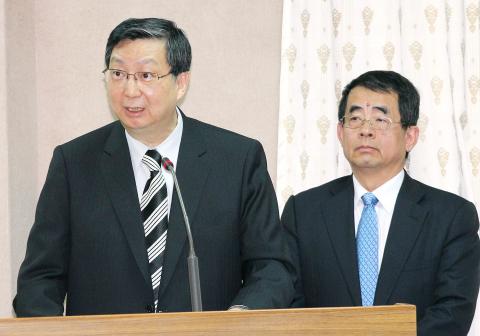Vice Minister of Economic Affairs Bill Cho (卓士昭) yesterday provided general information to lawmakers about the costs and benefits of a potential entry by Taiwan into the Trans-Pacific Partnership (TPP), drawing criticism about the government’s preparedness to steer the nation toward securing a seat in the emerging regional economic integration agreement.
Cho and Minister of Foreign Affairs David Lin (林永樂) attended a meeting of the legislature’s Foreign Affairs and National Defense Committee for discussion of the TPP issue.
Cho told Democratic Progressive Party (DPP) Legislator Chen Ou-po (陳歐珀) that agriculture was the sector that would be hit the hardest if Taiwan joins the TPP, with its production value estimated to fall by NT$72.77 billion (U$2.442 billion). President Ma Ying-jeou (馬英九) earlier this year said that Taiwan could join the TPP within eight years.

Photo: CNA
According to statistics from the Council of Agriculture, the output value of the agricultural sector stood at NT$475.52 billion in 2011.
Cho did not explain whether that loss was estimated on an annual basis or on a longer period.
Questioned later by other lawmakers who were eager to know the exact details of the estimates, Cho said he did not have comprehensive information at hand.
“By all accounts, the benefits of TPP membership outweigh the costs,” Cho said, basing his remarks on an impact assessment conducted by the Chung-Hua Institute for Economic Research (CIER).
CIER’s initial report showed that joining the TPP would increase the nation’s GDP by 1.46 percent and that the nation’s textile industry’s production value would increase by US$4.46 billion; that of the chemical, plastic and rubber products industry by US$2.023 billion; the leather garment and leather product industry by between US$1.2 billion and US$1.4 billion; and the services industry by US$11.562 billion, Cho said.
Cho said that CIER is expected to present a detailed assessment report in June.
Chinese Nationalist Party (KMT) Legislator Chen Pi-han (陳碧涵) demanded that the ministry present the committee with its analysis of how Taiwan’s entry into the TPP would affect agricultural jobs, cause reduced income for farmers and reduce the nation’s food self-sufficiency ratio, as well as the government’s response strategies.
DPP Legislator Hsiao Bi-khim (蕭美琴) urged the government to be more explicit about unresolved trade issues between Taiwan and its trading partners.
Hsiao said that the government needed to speak plainly to those who might be negatively affected by bilateral or multilateral free-trade agreements and discuss with them measures to help them adjust to trade liberalization.

‘DENIAL DEFENSE’: The US would increase its military presence with uncrewed ships, and submarines, while boosting defense in the Indo-Pacific, a Pete Hegseth memo said The US is reorienting its military strategy to focus primarily on deterring a potential Chinese invasion of Taiwan, a memo signed by US Secretary of Defense Pete Hegseth showed. The memo also called on Taiwan to increase its defense spending. The document, known as the “Interim National Defense Strategic Guidance,” was distributed this month and detailed the national defense plans of US President Donald Trump’s administration, an article in the Washington Post said on Saturday. It outlines how the US can prepare for a potential war with China and defend itself from threats in the “near abroad,” including Greenland and the Panama

A magnitude 4.9 earthquake struck off Tainan at 11:47am today, the Central Weather Administration (CWA) said. The hypocenter was 32.3km northeast of Tainan City Hall at a depth of 7.3km, CWA data showed. The intensity of the quake, which gauges the actual effect of a seismic event, measured 4 in Tainan and Chiayi County on Taiwan's seven-tier intensity scale, the data showed. The quake had an intensity of 3 in Chiayi City and County, and Yunlin County, while it was measured as 2 in Kaohsiung, Nantou County, Changhua County, Taitung County and offshore Penghu County, the data showed. There were no immediate reports of

The Chinese Nationalist Party (KMT) is maintaining close ties with Beijing, the Democratic Progressive Party (DPP) said yesterday, hours after a new round of Chinese military drills in the Taiwan Strait began. Political parties in a democracy have a responsibility to be loyal to the nation and defend its sovereignty, DPP spokesman Justin Wu (吳崢) told a news conference in Taipei. His comments came hours after Beijing announced via Chinese state media that the Chinese People’s Liberation Army’s Eastern Theater Command was holding large-scale drills simulating a multi-pronged attack on Taiwan. Contrary to the KMT’s claims that it is staunchly anti-communist, KMT Deputy

RESPONSE: The government would investigate incidents of Taiwanese entertainers in China promoting CCP propaganda online in contravention of the law, the source said Taiwanese entertainers living in China who are found to have contravened cross-strait regulations or collaborated with the Chinese Communist Party (CCP) could be subject to fines, a source said on Sunday. Several Taiwanese entertainers have posted on the social media platform Sina Weibo saying that Taiwan “must be returned” to China, and sharing news articles from Chinese state media. In response, the Mainland Affairs Council (MAC) has asked the Ministry of Culture to investigate whether the entertainers had contravened any laws, and asked for them to be questioned upon their return to Taiwan, an official familiar with the matter said. To curb repeated